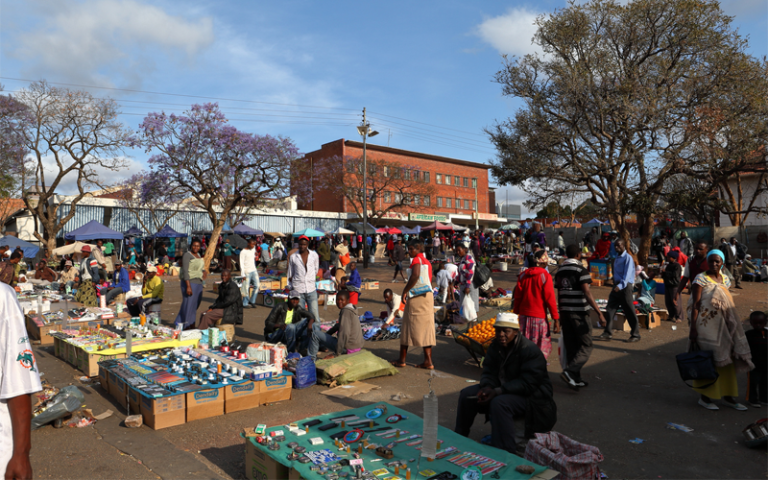Understanding how party foot soldiers impact voters in Zimbabwe
Dr Adam Harris (UCL Political Science) used UCL-Wits University Strategic Partner Funds to run focus groups with individuals affected by party foot soldiers in urban Zimbabwe.

28 April 2023
The political situation in Zimbabwe has been unstable for decades, and things have felt even more uncertain since Robert Mugabe passed away in 2019 and Mnangagwa came into power. The ruling party and voters mainly come into contact through party foot soldiers, or party activists. In high density urban contexts, these party foot soldiers often extract illegal taxes from people. The interactions people have with party foot soldiers influences their experience of politics and voting behaviour, but little is known about the detail or impact of this dynamic.
In response to this, Dr Adam Harris used UCL-Wits University Strategic Partner Funds to explore this topic further. In partnership with Dr Nicole Beardsworth at Witswatersrand (Wits) University, he ran focus groups with affected individuals to find out more about their experiences.
Political and economic situations intertwined
“There’s a lot of interest in political dynamics across Africa, but research often tends to focus on either what the voters are doing, or on parties,” Adam explained. “We wanted to bring these theoretical and empirical perspectives together to look at the interaction.”
Adam found that the political interactions people have in Zimbabwe cannot be looked at without factoring in the economic situation too. “There’s a persistent, worsening economic meltdown in Zimbabwe,” he said. “The vast majority of people in urban centres are employed in the informal economy. For most people this means having a market stall. You get hold of what you can, and you sell what you can in order to survive.”
The ruling party sends party foot soldiers into these neighbourhoods and markets to extract informal or illegal taxes from people. This is a key way that parties make money and fund their operations. “If a market seller can get hold of high value items such as car parts, they can make quite a bit of money,” Adam said. “But most people are selling low value items, like fruit and vegetables. They might be earning $3 a day, so it is more significant when they have to pay the party taxes from this. Estimates from previous studies suggest that it's 20- 30% of people's revenue that is being extracted by the party.”
With this as the backdrop, Adam wanted to understand more about how these vendors experience politics. In particular, he and his colleagues looked at the ways these individuals are extracted from and coerced into doing certain things, and how that impacts their voting behaviour and their willingness to engage in politics.
The result was a series of interviews with informal workers unions, and focus groups with vendors from different parts of Harare. “The extraction of funds is very common, and the precarity is very serious,” Adam said. “They’re getting very angry and frustrated with the status quo. And they’re willing to go out and vote against the ruling party, because they want change. But they’ve been feeling this since at least the year 2000, and they don’t know how long this lack of change will last.”
Adam found that the ruling party is largely uninterested in this population, because most of their votes come from rural areas, where they hand out goods and services prior to elections to help secure votes. “In a way, they extract from urban areas and redistribute to the rural areas,” Adam said. “This heavy reliance on rural voters is keeping them in power at the expense of the urban voters. We know that this is unsustainable, but the big question is, ‘when will it break?’”
Creating safety nets to protect livelihoods
One finding from the focus groups is that safety nets that exist in these high density, urban areas could help people resist the way party foot soldiers coerce taxes from individuals. For example, in these communities, there are savings groups, church groups, youth sports clubs and more. These groups help people survive in their precarious circumstances. Adam says this is a really important aspect that needs more research moving forward, and he has secured more funding from the UCL Global Engagement Office to do so.
“We're trying to understand the ways in which communities can band together to resist this in a way that at least protects their livelihoods, even if that doesn't bring about larger political change,” Adam said. “First and foremost, people are interested in protecting their livelihoods and making sure they can survive. We think there are ways in which being part of support networks helps this. That's what we're hoping to explore more systematically, to see how people in different networks can access support and present resistance to the interference from the ruling party.” To do this, Adam and his collaborators will be undertaking surveys in Harare and Bulawayo, building on the information they gained from this project.
Adam has also benefited professionally from this project. “I’ve done a lot of work in South Africa, but this was my first chance to study Zimbabwe,” Adam said. “They come from a similar background of colonial rule, but Zimbabwe has had a much more violent transition to independence. Being able to understand these two contexts is important for my general understanding.”
The connections with others that Adam has made have also been beneficial, in particular the one with Dr Nicole Beardsworth. “She has a lot of deep expertise in Zimbabwe, and expertise on the party side, where I come with expertise on the voter side,” Adam said. “And she's more qualitative; I'm more quantitative. So it was a very nice marrying of expertise. As a whole, it’s broadened my horizons, as well as creating an opportunity to work with excellent scholars located in the region of study.”
 Close
Close

